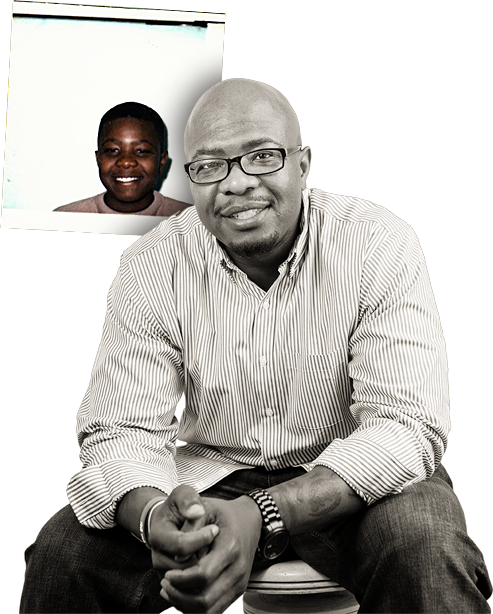
See additional footage of Tamika
See List of Dreamers
Johnny Sidbury
To be honest with you, the majority of us wouldn't even have made it through junior high school without Mrs. Rumbarger. Oh, words can't even explain some of the things that I've seen Mrs. Rumbarger do, and what she means to me. She took care of some of us when we didn't have places to go, as far as, like, home at night. She kept some of us, clothed some of us, fed some of us. After a time, I didn't look at her as someone, you know, of a color or anything. She was, like, a blessing, like an angel to some of us. I know for a fact that Mrs. Rumbarger went too far out the way at times, just to help us. Like, the neighborhood some of us used to live in, she used to drop us off or come get us with no fear whatsoever in her eyes. And I'm like, wow, are you serious: Mrs. Rumbarger around Pitts Place? I mean, it was like some places you just don't go to unless you from there or you know someone, you know? And for her to be a white woman, to do those things that she was doing—wow. You know, no one never harmed her or nothing. That's why I say, honestly, I feel as though Mrs. Rumbarger is like a angel. I really don’t think she’s human. I'm just exaggerating. But I think her and Mr. Bumbaugh definitely was a gift of God to us all. I'm not going to say to some of us—to us all.
When Mr. Bumbaugh came, probably, like, 8th or 9th grade, we thought he was a teenager because of how young he looked! And we were like, Man, shoot, we’re not trying to listen to you. But first day Mr. Bumbaugh gets there, he breaks up a fight in school. And the brother had blood all on his shirt and tie, like, What am I getting myself into? But we really saw how serious he was. Mr. Bumbaugh, man, he was one of a kind. I've never met a man like him, intelligent as he was. The ones that needed special attention, they was focused, they listened to him. When teachers couldn’t get things through, he would come along. And he was an athlete. When we used to go on field trips, camping trips, he let us get, like, 50 yards in front of him. And about the time of the finish line, you'd think a horse was running past you—that's how athletic he was. He was attentive to us. He didn't take no mess from us. Always well-dressed. He spoke Spanish and English. Had a good, open heart at all times. Honestly, I don’t ever recall seeing Mr. Bumbaugh angry. He was like a role model of what a man should be at his age.
He would pick us up, play basketball with us on weekends. We would go over to his house. I mean, he showed us this part of Washington, D.C. that we didn't even known that exists, because he lived in Georgetown at that time. He had a buddy that lived with him, he was a pilot for the United States Army or Navy. He kept us around real positive gentlemen, guys that was on his level. I used to hang around just to be around him. I mean, I don't know what the other guys was getting out of it, but I was watching how they were men, right? You know, they kept their watch on. They kept their hair cut, well-groomed. You know, it was about their business. It wasn't no half-stepping at all.
Probably going to the 12th-grade year, we went on a college tour. They told us, get copies of our report card, SAT score, and we'd go see if we can get accepted at colleges. We started in Virginia and I think we went as far as South Carolina or Georgia. At Johnson C. Smith. I filled out my application, and they accepted me there on the spot! I was, like, “Excuse me I have to call my mother.” So I said, “Ma, I got accepted.” She dropped the phone. Then my stepfather picked up the phone. And so my college career started from there. I stuck in there, I persevered, and I graduated—that’s the main thing. I lived my dream: played college football. I tried out for the European league twice. That was a great experience for me. I feel as though without the I Have a Dream program, and the things that they did for me, I probably wouldn’t even have went that far.
You know, I was debating about telling you this story, but I think I am: Probably, like, my junior year in college, I had a sociology class. And my teacher was talking about how people do surveys, case studies—like, nine of out 10… So, I'm sitting back. I'm, like, damn: Was the I Have a Dream program a case study or something? Like to see the number of black kids from my area that would graduate from junior high and high school and go to college and finish—when they know they have assistance going to college; would they take advantage of it? And you know, it bothered me a little bit when I thought it was a research thing. I was, like, Man, hold up.
I'm just being straight-up honest with you, I kind of got mad, because out of 67 of us, only, like, six or seven—that I know of—had went to college. And that really bothered me, because it seemed like, if it was a case study, it made it seem like a negative point of view on my generation at that time. Like, you mean to tell me, out of 67 kids, you're only going to get four or five of them to finish a program? You know, what's the problem? I called Mr. Bumbaugh; I don’t remember what he said, but he made me feel like it wasn’t no case study.
If I had the opportunity to run a 500 Fortune company, I could probably name, like, five, 10, Dreamers right now that could probably run it without any guidance—just off the wits. But it was just the neighborhood we was in, you know. It was a lot of distraction growing up in Washington, DC during that time. It was the Reagan-George Bush era. Crack epidemic. Becoming a teenager. You know, smelling yourself, wanting to have a girlfriend, wanting to be popular. And some of those things took some of us under, to the point where we didn’t know how to control it once we got it. And then, once we realized we had too much of it, we couldn’t deal with it. And some of us got killed throughout the years.
Yeah, Rafiq got killed. That was a real tough time for me—I’ve been knowing Rafiq since I was, like, four years old. Rafiq was very intelligent, very focused. I’ll give you an example of a conversation as a 13, 14-year-old kid: We were walking down Good Hope Road, and I forgot who was with us. Someone was like, "Man, you know, Chinese people moving in, buying stores, they got everything in our neighborhood. We don't own nothing." So, Rafiq was, like, "You know what? You can't even be mad at them. We've been around here for years. The store had a for-sale sign on there for years. Your mother or father could have bought it. Don't blame them. You're to blame yourself." He was that type of guy. His family was very pro-black, Black Panther type, afro-centric type family. With Rafiq’s mind, he could have been a civil rights leader. But just the neighborhood, Rafig just got caught up.
I'm not talking bad about D.C. I'm not trying to talk bad about none of the Dreamers, it's just the way it was during that time. And Kramer Junior High School, I mean, I lived a block away, and it used to take me, probably, like, 10, 15 minutes to get home. Kramer separated two street gangs. So, you had—I'm not trying to say the names—one gang on one side of Kramer; and you had a gang on the other side. And imagine yourself leaving out the door wondering which way you’re going to go, and you just live a block away. You know, neighborhood gangs fighting neighborhood gangs. You hear about it in school, and about the time 3 o'clock comes, it develops so much that—I mean, I’m not trying to be no punk or nothing, but I'm not trying to go out there and get into it or be a innocent bystander. This wasn't every day, but it was some moments it could be that way. Sometimes I notice that Mr. Bumbaugh and Mrs. Rumbarger used to have activities for us. So, we could probably stay a little bit at the school, let everything die down.
Then in high school, it was hard for me to get caught up in my neighborhood because I was never home. I started playing football at Eastern, and by the time I got home, it was like 8:30, 9 at night. I mean, I’m exhausted, I just finished running like 21 sprints, you know. So I just look at my experience just totally different. I just tried to take full advantage of everything.
When I went to college, I took full advantage of everything, you know, a fraternity, football, campus life, living on my own, didn’t have mommy or daddy in the next room, you know, had to man up and make my own decisions even if it was right or wrong, you know, washing my own clothes. My attitude changed. It went from walking down the street not even saying nothing to the person you’re passing by to, Hey, how you doing? I kind of got used to that Southern hospitality and when I came home it took me like two or three days to adjust. Because you have to realize what was going on in the street: who was beefin with who. It was like you’re getting instructed all over. And I just got tired of it, so I was like you know what man, I’m going to just stay in Charlotte during the summer, work, work out, take some classes.
Without “I Have a Dream,” honestly, I probably wouldn’t have went to college. I probably would have done something basic, stayed in the area. I just thank God that, you know, I had a well-balanced home. That my mother and my father let me know that this was a blessing. And now, I have a bachelor's of science degree in business administration. I'm an accountant now for the District government. I'm thankful that I'm able to work in my career that I chose. I'm married. Three kids. You know, beautiful wife. And I appreciate it. You know, I mean, right now, I really don't want for anything. And if any of the Dreamers really need assistance, I’d do whatever I can for them—or for Mrs. Rumbarger and Mr. Bumbaugh and Mr. Bainum. You know, because I really shouldn't be sitting here talking to you right now.



